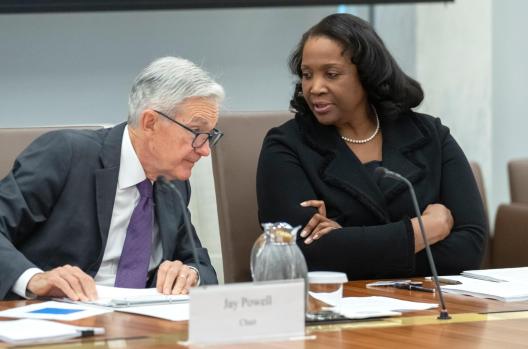By Associated Press’s Mary Clare Jalonsick
Washington (AP) Republicans in the Senate are thinking of amending Senate rules to expedite the confirmation of President Donald Trump’s nominees for the executive branch.
As Trump puts pressure on Democrats to fill scores of cabinet positions before they are set to depart town for the month-long August recess, the action sets up a potential conflict with them in the days ahead.
By keeping the Senate in session for more days and longer hours than Trump’s first term, Senate Majority Leader John Thune has already more than doubled the number of confirmations from the executive branch and the judiciary. Despite this, Trump claims he wants more, and Democrats are postponing voting on almost all of his nominees because they believe his choices are too radical.
“If the Democrats continue on this path of obstruction that they’re on right now, we may need to look at doing things differently on nominees generally,” Thune said Wednesday morning, adding that the number of votes that are willing to modify Senate rules is currently rapidly increasing on our side.
Related Articles
-
Senate confirms Trump s pick for counterterrorism agency, a former Green Beret with extremist ties
-
Judge orders Trump administration to explain why order to restore Voice of America wasn t followed
-
Biden aide denounces GOP probe into former president s health as baseless and denies any cover-up
-
Brown University strikes agreement to resolve discrimination complaints and restore federal funding
-
US to share biometric data with Chile to track criminals, Homeland Security s Noem says
The impasse between the two parties is expected to intensify over the course of the upcoming week, with Trump urging Republicans to act even faster or call off their August recess. Even while senators from both parties are keen to get away from town after several hard months of labor and acrimonious partisan battles over legislation, Democrats are not particularly inclined to comply with Thune’s demand that a tranche of candidates be confirmed before they depart.
Although the Senate’s battle over nominations is not new, it has gotten more intense over the past 20 years as both parties have employed stalling strategies to postpone confirmations that were formerly swift, bipartisan, and standard. Republicans rejected President Barack Obama’s judicial appointments, so Democrats modified Senate rules for lower court judicial nominees in 2013 to eliminate the 60-vote need for approvals. Republicans followed suit in 2017 when Democrats attempted to oppose Trump’s nomination of Justice Neil Gorsuch to the Supreme Court.
This year, however, Democrats have rejected more nominations than normal, preventing any swift unanimous consent votes and requiring roll calls for each applicant—a drawn-out procedure that takes days for each nominee and includes discussion time. The minority party hasn’t permitted at least a few speedy confirmations for the first time in recent memory.
“Democrats have blocked quick votes because historically poor nominees deserved historic levels of scrutiny,” said Senate Democratic Leader Chuck Schumer.
However, Thune claimed that Democrats are abusing the rules and that the GOP conference is very interested in maybe expediting the procedure. When they hold the president, a rule change may ultimately be advantageous to both parties.
Although it’s unclear how Republicans would alter the rules, they might, among other things, limit the number of procedural votes, shorten or do away with the two hours of discussion time, or even require nominations to be bundled together. Nearly all 53 Republicans in the Senate would need to support a rules change since it would need a simple majority vote.
According to Sen. John Hoeven of North Dakota, all ideas are up for debate among Republican senators.
“We would prefer not to,” Hoeven remarked. We would not be in this predicament if they used the same strategy that we previously provided to Biden.
Although Democrats would probably oppose any attempt to alter the rules, they had previously debated such measures when Republicans were obstructing their own nominations. According to Democratic Senator Richard Blumenthal of Connecticut, Republicans would be avoiding scrutiny for presidential selections if they were to suggest doing away with debate time.
Sen. Tim Kaine, a Democrat from Virginia, has previously stated that he might be amenable to amending Senate rules in order to decrease the number of federal jobs that are confirmed by the Senate. However, he stated that he would not be amenable to shortening the nominees’ debating time.
According to Kaine, there are some extremely significant nominees for whom two hours is insufficient, but there may be non-controversial ones for whom it is not.
Trump, who has publicly urged Republicans to postpone the August session in order to confirm additional candidates, is putting pressure on the GOP leader. On social media this week, Trump again attacked Senate Republicans for maintaining the so-called “blue slip” procedure, which gives senators from the home state the power to accept or reject some judicial choices.
Trump urged Senate Judiciary Committee Chairman Chuck Grassley, R-Iowa, to have the guts to cease honoring the blue slip forms sent to the senators from the home states, regardless of party, in a post on Truth Social on Tuesday. Trump claimed that because of this tradition, only Democrats or a feeble and incompetent Republican may receive a nomination.
Trump wrote, “I got Chuck Grassley re-elected to the U.S. Senate when he was down, by a lot, in the Great State of Iowa.” Grassley could resolve the Blue Slip issue.
On Thursday, Grassley opened a committee hearing by defending the practice and saying, “I’m disappointed that it would result in personal insults,” adding that he was offended by the president’s remarks.
Thune supported the procedure on Wednesday as well, pointing out that he had personally used the blue slip procedure when there was a judicial vacancy in South Dakota under the administration of former President Joe Biden. Thune remarked, “I don’t sense any rush to change it.”












